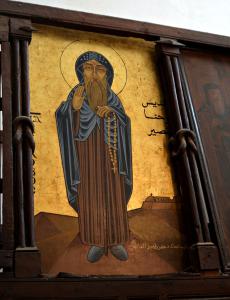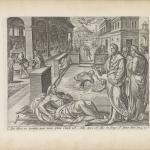
One of the things which can harm us is the expectations others have for us. The more highly regarded they think we are, the greater the expectations they have for us. As many of us enjoy the praise and accolades we get, we try to fulfil those expectations, and as a result, find our lives transformed by them until it can be said we become slaves to them. This does not mean we should be selfish, ignoring our relationships with others, thinking any obligation we have thanks to those relationships, is akin to slavery. We are in the world together. We need to help each other. We should care for each other, doing what we can to promote the common good, and not just our own private gain at the expense of others. The problem is not those kinds of expectations, that is, those based upon our normative relationships with others, but rather, the expectations fame can give us, expectations which have people think we can and should do things which we often can’t. As they are not reasonable, those expectations can be rather difficult to fulfill, and sometimes, they can and will take a lot out of us to do so. This is one of the reasons why we should not give or receive undue praise from each other, for such praise comes with obligations, obligations which not only are difficult to fulfill, but in fulfilling them, can turn us away from our true potential. And since we won’t fulfill our potential, we end up hurting ourselves in the process. This is why St. Macarius the Great was upset when St. Pambo praised him and the power Pambo thought he possessed:
Abba Macarius and Abba Pambo were walking in the mountains one time. Abba Pambo seized Abba Macarius’ hands and kissed them, saying, “Power will come forth from these small hands.”
Abba Macarius said to him, “Please be quiet, Pambo, my brother. How your words have become blows that wound me!”[1]
Macarius wanted to live the life of a simple monk, but he quickly found himself becoming much more than that. His holiness attracted attention. His holiness brought people to him, and with it, they brought all kinds of expectations with them, expectations which they unloaded upon him, causing him great stress. People expected him to be a miracle worker, that is, in and through him, God would work great things in the world. Many of them wanted to be next to him hoping that by being so close to him, some of his holiness could come upon them as well, and with it, they would receive some sort of blessing from God. And, while it is true, stories concerning him indicate God worked such miracles through him, they were not what Macarius himself sought for or desired. This is made especially clear here. Pambo told him about all the expectations the community had for him, expectations centered around the power they thought he had. Macarius found it troubling, as he saw how such expectations brought with them all kinds of temptations. He knew what people wanted from him was a show of power instead of true holiness, and he, knowing their desires, didn’t want to disappoint them, but also knew that what they wanted was wrong. Each of these temptations came to him as if he were struck by someone, wounding him. He didn’t go into the desert to be praised, to be treated as a holy miracle worker – he went to learn how to properly die to himself and give himself over fully to God. And to do so, that meant, he might have to fight against himself, spiritually if not physically.
Thus, Pambo, and therefore, the community surrounding him, tempted him to do great things to prove himself to others, to draw forth the power they believed his holiness gave to him, and to use it for his own glorification; he had to fight that temptation no matter how difficult a fight it was, no matter how many blows he must strike against himself in order to stop himself from giving in to it. In the end, he knew, paradoxically, that this was the only way he could actually fulfill their desires. For only by dying to the self was he able to find the holiness they expected him to have, the holiness which would allow him to truly be a conduit of graces to the world. For he had learned true greatness was to be found in self-denial, and true glorification was found in the rejection of self-glorification: “For every one who exalts himself will be humbled, and he who humbles himself will be exalted.” (Lk. 14:11 RSV). Sadly, the more people came to speak with him, telling him of their great expectations, the more he had to struggle to keep himself humble, and so, the more he had to deny himself, causing himself more and more pain and sorrow.
Just as each praise, each expectation, wounded him, they can and will would us all. We are called to holiness. We must understand the path of holiness, the path to true greatness, cannot be found with short-cuts, where we try to pull ourselves up to a position of greatness all by ourselves, but rather, it is found only in and with humility. We must deny ourselves all attempts of such self-glorification. For, the more we try to glorify ourselves, the more we want praise from others, which, though we might receive it, we will find it will be as ephemeral as our glory, as both will eventually disappear and we will be left with nothing.
Instead of seeking the favor of others, instead of trying to earn their praises, we should be seeking the favor of God, for God’s favor, grace, can bring us everlasting glory. The more we pursue holiness, the more we should serve Christ by denying ourselves of all such self-glorification. And so, the more we pursue holiness, the less we will desire or care for accolades. Eventually we will be like Paul and say: “Am I now seeking the favor of men, or of God? Or am I trying to please men? If I were still pleasing men, I should not be a servant of Christ” (Gal. 1:10 RSV). We will, likewise, imitate Paul, when he said: “For we never used either words of flattery, as you know, or a cloak for greed, as God is witness; nor did we seek glory from men, whether from you or from others, though we might have made demands as apostles of Christ. (1 Thes. 2:5-6 RSV). We will understand how fickle others can be. We will recognize how short their attention span is, and with it, how little we would get from their praise. Indeed, we will know such praise comes with it all kinds of expectations, and once we do not fulfill them, we will find those praises will be gone; those who once praised us will abandon us and look elsewhere for someone else to follow and praise. Macarius knew this; but he also knew that serving God meant that he would also serve others, guiding them with love and grace. This is why he knew he could not just ignore those coming to him. He had to take care of them, even as he knew, in doing so, they would come with expectations and temptations for him to fight. He knew many would come to him for all the wrong reasons, hoping to use him, praising him for the sake of controlling him through their praise, hoping that by doing so, they will control the power which flowed through him. The more they did that, the more he had to resist them while finding a way to serve them. Obviously, that made his own spiritual progression that much more difficult. But, to be sure, he cared for those who came to him. He wanted them to experience true glory for themselves. It probably saddened him discover that someone like Pambo was far from the path at this point, for Pambo was another desert father who should have known better. Pambo’s words probably wounded Macarius, for they showed how much he had failed in directing those who came to him. While we might not be a desert monk like Macarius, we have to deal with something similar in our lives, and so, though we might not be miracle workers, we still will have to struggle to find the right way to deal with others, helping them while staying clear of the pride and vainglory which can come from such work, the pride and vainglory which can turn us around and away from the good we are trying to achieve.
[1] St. Macarius the Great, “The Sayings of St. Macarius of Egypt” in St. Macarius The Spiritbearer: Coptic Texts Relating To Saint Macarius The Great. Trans. Tim Vivian (Crestwood, NY: St Vladimir’s Seminary Press, 2004), 68-9.
Stay in touch! Like A Little Bit of Nothing on Facebook.
If you liked what you read, please consider sharing it with your friends and family!
N.B.: While I read comments to moderate them, I rarely respond to them. If I don’t respond to your comment directly, don’t assume I am unthankful for it. I appreciate it. But I want readers to feel free to ask questions, and hopefully, dialogue with each other. I have shared what I wanted to say, though some responses will get a brief reply by me, or, if I find it interesting and something I can engage fully, as the foundation for another post. I have had many posts inspired or improved upon thanks to my readers.













